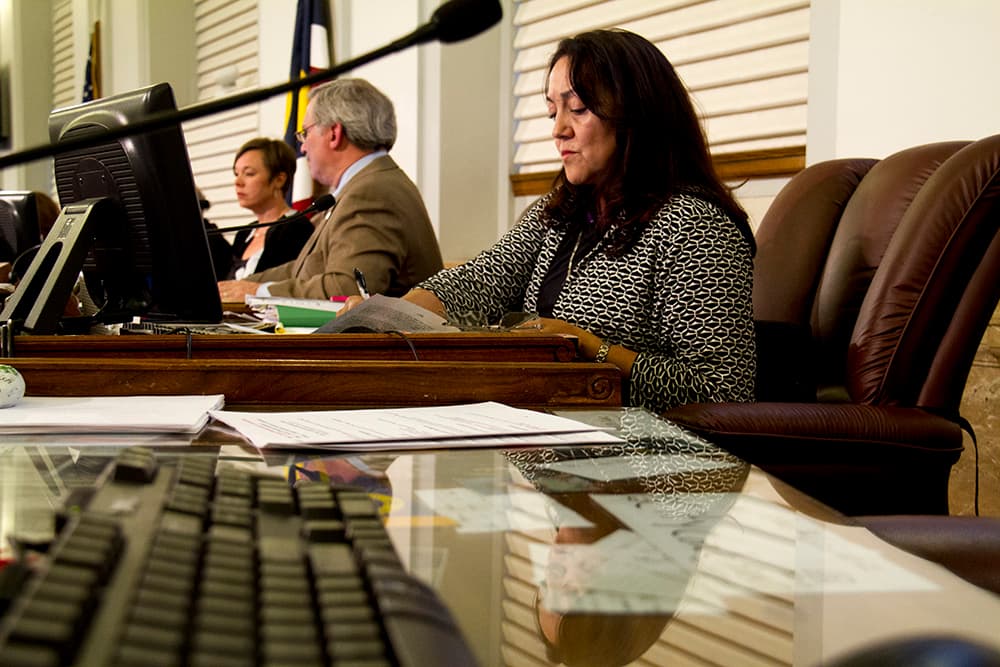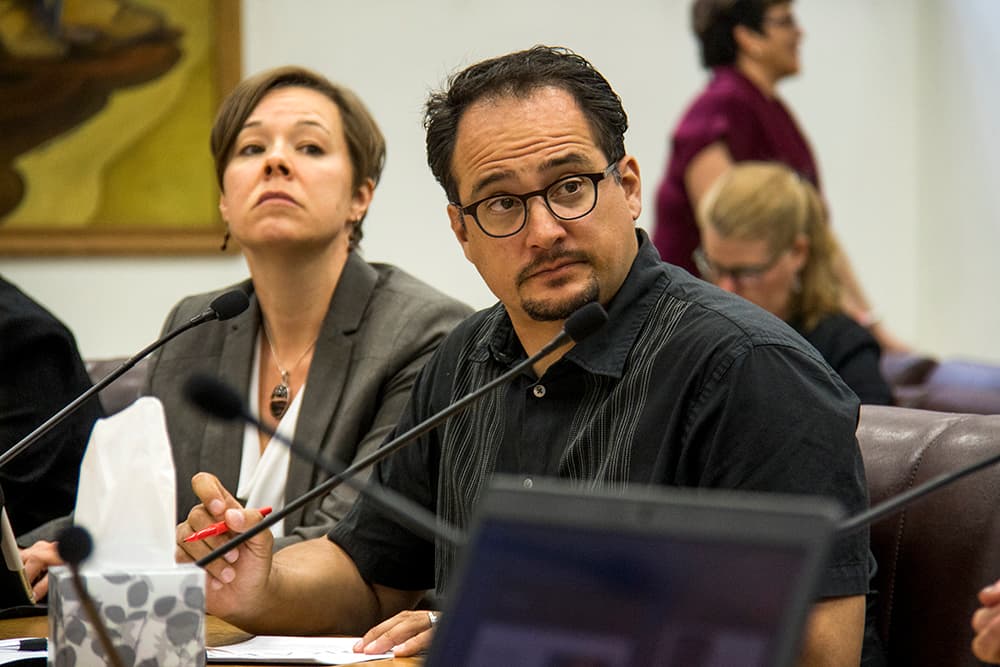Denver Mayor Michael Hancock wants to create an office within city government that will screen, vet and shepherd public-private partnerships related to major city projects, like the redevelopment of the National Western Center and the Denver Center for the Performing Arts -- and other projects the city might not even have anticipated yet.
Under the proposal, City Council would get to set the broad parameters of deals, but contracts would be finalized at the administrative level.
The effort is causing major concerns among some City Council members about what authority they'll give up if the idea goes forward. That concern is only exacerbated as they debate the contract for the Great Hall renovations at Denver International Airport, a public-private partnership that will see Ferrovial and its development partners get paid as much as $1.8 billion over a 34-year period for a $650 million to $770 million project.
That airport contract passed out of the council's Business, Arts, Workforce and Aeronautical Services Committee this week with Councilwoman At-large Debbie Ortega casting the lone "no" vote, but other non-voting members also expressed concerns about whether the contract is really a good deal for the city and whether they'll have the information they need to make an informed decision before a Sept. 1 deadline. If the city doesn't move forward with a contract by then, they'll pay a $9 million penalty to the developer.
"Absolutely," Ortega said when I asked her if the experience with the DIA contract was shaping her approach to the proposed "P3" office. "The transparency has been visibly absent from this process."

"I'm not just speaking for myself when I say that the airport contract makes me more concerned and makes me want to scrutinize this information more," Councilwoman At-large Robin Kniech said of the P3 office. "... That is just the microcosm of what we could see in the future. It's not like we’re, 'Oh, hey, we’re all gung-ho about the airport, and let's do a lot more of these.'"
Emily Hauber, deputy legislative director in the Mayor's Office, said the complexity of these deals and the need to protect the public interest is exactly why the city is considering a specialized office.
"We have lots of capital needs in the city right now and there are a couple major, complex projects coming down the pike," she said. "We want to make sure any projects are done in a way that is transparent and incorporates Denver’s values and are done in a way that captures the most value for the city. Public-private partnerships can mean a broad range of things. Before we expend too many resources on this, we want to develop a fairly standard way to vet projects and make sure we are only moving forward the most viable projects."
What is a public-private partnership -- or P3 as they've come to be called?
This term can mean a lot of different things. The office that the city envisions would deal with projects in which a private entity would "design, build, operate and maintain" a piece of public infrastructure or "design, build, finance, operate and maintain" or just "design, build and finance" the project.
The most common type of public-private partnerships in Colorado involve toll lanes on highways. The I-70 expansion will be a P3, as was the additional lane on U.S. 36. A private company takes on additional risks and responsibilities in a highway project in exchange for the ability to collect toll revenue -- which would otherwise go to the government -- for a period of time.
Denver's not about to start doing toll roads, and the revenue models are likely to be more complex with city projects. In the case of DIA, Great Hall Partners would have exclusive control over concessions in the main terminal and collect a portion of concessions revenue, while the city would make additional payments to the developer out of its share of concessions revenue. Public-private partnerships are under consideration for the later stages of the National Western redevelopment, like the Coliseum site, and the Denver Center for the Performing Arts, Hauber said. Officials also want to be able to evaluate "unsolicited" public-private partnerships, in which companies pitch ideas to the city.
Whatever the project, the private entity needs to see some way for it to make money off the deal. That's why they're at the table.
"It is not free money," said Shar Habibi, research and policy director at In the Public Interest, a policy center that studies best practices in government contracting and public-private partnerships. "This is not the private sector coming in and saying, 'We’re going to fund this.' This is the private sector saying, 'We are going to give you a very expensive loan for this.'"
And what's in it for the public partner?
Private financing often costs more than public financing, especially for entities like Denver with a AAA bond rating, but private financing can bring other benefits. Mitigating risk is often one of the major justifications for public-private partnerships. The private party might agree to be responsible for cost overruns or delays, for example. Or the private entity might make commitments around maintenance when city maintenance is more vulnerable to the whims of the budget cycle.
"If we’re going to pay more for our finance, what are the benefits we get from that? Normally in these deals, it’s all about risk exposure," said Adie Tomer, a fellow at the Brookings Institution's Metropolitan Policy Program. "Each side is trying to minimize their own risk and transfer as much risk as possible to the other side."
P3s are also a way to get financing that's "off the books" in the sense that it won't affect a public entity's bond rating or debt limits -- or it might not require voter approval the way a bond issue or tax increase would.
"Let’s say you’re a city that’s about to hit your bond cap or there is no political will to issue bonds -- or some jurisdictions are just ideologically interested in giving private companies more control over infrastructure -- those are reasons you might want to go the P3 route," Habibi said. "It doesn’t show up on the balance sheet in the same way. However, you do have to pay for it some way. This is a contract, and you are still obligated to pay for it."
Habibi said P3s can be the right approach for some projects, but cities and states need to proceed very carefully.
An infamous example is the Chicago parking meter deal, in which the city rushed through a deal to give a private company control of parking meter revenue for 75 years in exchange for a desperately needed $1.15 billion cash infusion. Chicago ended up having to pay the company for anything that reduced parking meter revenue, including adding bike lanes or closing the street for a weekend festival.
This is where the idea of a P3 office comes in.
Tomer sees having these offices as essential for public entities that want to play in this arena.
"You have to have expertise that is as focused on the role of private finance as the private financiers are," he said. "There have been many deals where some information was not equal, and it did lead to a lot of questions later on and a lot of shouting about who was at fault."
Habibi said this approach sounds good -- in theory -- but it's important that P3 offices don't have a bias in favor of making public-private partnerships happen.
"There are a lot of revolving door issues where some of these folks work in the P3 industry and then come through and work on it on the government side," she said. "Because of their work in the industry, there is a natural orientation toward P3s as the way to go."
For any given project, public financing and traditional procurement should be analyzed objectively alongside private alternatives, and the actual value to the city or state of all its options should be clear.
Morteza Farajian, director of the P3 Office in the Virginia Department of Transportation, said his office says no to far more deals than it says yes to. The big advantage of having a specialized office is that expertise is retained from project to project "rather than reinventing the wheel." Procedures, standards and checks and balances are also standardized and consistent across projects, he said. While his office does transportation projects, it's become a resource for other entities, whether it's a county doing a parking garage deal or a university building a dormitory, and he frequently fields questions.
City Council members are concerned about accountability.
The governance structure for a Denver P3 office hasn't been determined. In fact, whether the office will in fact be created hasn't been determined. Right now, city officials are $475,000 deep into a contract with Arup Advisory Inc. to develop the program, and they've asked City Council to approve an additional $480,000 in consulting work (for a total of $955,000) to get the program up and running by year's end. The actual creation and staffing of the office would be part of the 2018 budget process.
But City Council members -- even those that like the idea of the office -- are concerned about the process that Arup has suggested for future deals. Instead of City Council getting an up or down vote on the final contract, as is the case now, council would approve a "parameters ordinance" or "framework ordinance" that lays out what they'd like to see in the deal. The city's P3 office would then go out looking for a partner willing to work with the city under those conditions. As long as the final contract complied with the framework ordinance, it could be approved administratively.
Hauber said this process would give council members more control earlier in the process compared to the status quo, in which council members can't renegotiate any part of the contract.
"This lets council set the framework in advance," she said. "These are the social values, these are the financial values, that we want to see."
If City Council didn't want to approve a framework ordinance on a particular project, it wouldn't preclude the use of a public-private partnership, Hauber said, and city officials could always bring forward a finalized contract. However, the framework ordinance provides a degree of certainty for the private parties negotiating on the other side of the deal -- the same type of certainty that Great Hall Partners is securing with a $9 million penalty. If they meet the criteria established in advance, they know they have a deal.
Ortega said she's very concerned about the possibility of not seeing final contracts.
"They want us to approve this P3 office, but is it going to be more of what we’ve seen with this (DIA) deal?" Ortega said. "The devil is always in the details."

"There are a lot of examples of what you need to be looking out for in the public interest," Kniech said. "Each deal has different risks. If you’re talking about wholesale privatization, you have concerns about worker conditions. You also have concerns about transparency. All of a sudden everything they’re doing is confidential business information, and it's proprietary. Our work is subject to review by the auditor. How do you do that same watchdogging of the contracts?"
At a committee meeting on the contract, Councilman Rafael Espinoza worried about the deteriorated condition that the city might see in public assets held by private companies for decades then returned to the city. Hauber said the city can put maintenance requirements into the contracts.
"I’m going to need some explanation for how we can pay more money through this (P3) process and get something down the road that is structurally sound than if we had built it cheaply through the city and maintained it properly over time," he said.
Habibi said she considers oversight by elected officials important, even though it's understandable that companies want to limit what they call "political risk."
"There is already a lot of power that is proposed to be vested in this office," she said. "These are really long-term contracts that have a lot of implications for the community, and we have to make sure these deals are not hurting the public. Having that additional layer of oversight is a necessary thing. I’m less concerned that companies have this political risk than a community getting screwed for 30 years."














